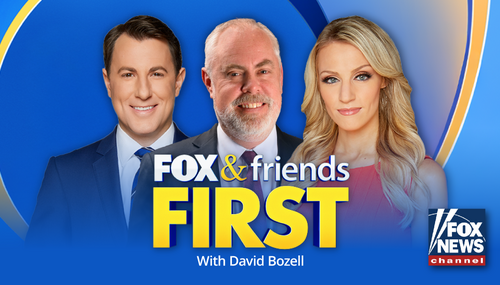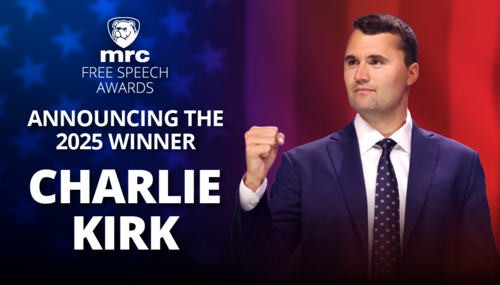On Sunday, as CNN host Fareed Zakaria devoted the entire first half hour of his Fareed Zakaria GPS show to a discussion of racial tensions in the U.S. with regard to police interactions with the black population, at one point he went over the top by wondering if the existence of racism in the U.S. after the election of a black President was similar to, "after you go to the gym, you feel like you've earned the right to have a milkshake."
For her part, liberal CNN political commentator Angela Rye asserted that America was "built upon" racism, as she alluded to the Three-Fifths Compromise, and ended up lamenting that "The last time America was great to me" was "in 2008 when" Barack Obama "was elected President, and ever since then, we've been paying the price for that."
At 10:27 a.m. ET, Zakaria turned to Rye and likened engaging in racism to having a milkshake as he posed:
Angela, what do we make of the fact that we have an African-American President? There is a theory -- Malcolm Gladwell talks about it in his recent podcast -- that the fact that you have allowed in a member of an excluded minority in a strange way then gives you license to continue the old pattern of discrimination? Sort of like, after you go to the gym, you feel like you've earned the right to have a milkshake. Does that make any sense to you? That the fact that you have elected an African-American actually could mean a sort of reversion to patterns of discrimination?
The liberal CNN commentator eagerly agreed with his premise as she began:
Well, it certainly appears to be the case, Fareed. I think it's interesting even that you used the term "allowed," that he was allowed to be there. That's terminology that we would never use to describe the 43 presidents who preceded him.
After recalling that a friend of hers was upset that recent high-profile violent interactions between police officers and black suspects still happened even while there was a black President, she continued:
And I do think that people thought that they were doing the right thing. "I'll check the box, and I will allow this black man to become President, but then that means that I can show that because you all have made it, right? Because you have been now opened the doors at 1600 Pennsylvania (Avenue), now that means you are equal and I don't have to deal with the pattern and practice of discrimination that has existed in this country for years, or the vestiges of slavery." And I think that we would be remiss if we believe that that is, in fact, the case.
And then, even though it has long been observed that Donald Trump has managed to succeed even while saying things that would get most other politicians in dire trouble, Rye went to the liberal default of seeing a racial double standard between Trump and Obama as she added:
If you compare Donald Trump -- and I hate to make this political -- but if you compare Donald Trump and what he is allowed to do, compared to Barack Obama and what he can't do, the things that are allowed to come out of Donald Trump's mouth that Barack Obama could never say, I think that is illuminating in and of itself.
Rye soon declared that America was "great" the moment Obama was elected President in 2008, but that things have gotten worse since then:
The fact that his campaign slogan could be, "Make America Great Again," and that pains me and people who look like me to no end. The fact that he could reference something like Operation Wetback in a debate where hundreds of our Mexican brothers and sisters were killed, slaughtered, and taken out of this country because someone didn't allow them to be here anymore is exactly the problem. The last time America was great to me, Fareed, was in 2008 when he was elected President, and ever since then, we've been paying the price for that.
Rye, who on Friday asserted that "rogue cops" go out and "shoot black people for sport," had complained earlier in the show on Sunday that the U.S. was "built upon" racism after "white people got here." Rye:
I think, at some point, the issue is, we have to ID -- and by that, I just mean identify -- the fact that so much of this comes from the root of racism and what racism has done to every system in this country. That is what this country was built upon -- or I should say rebuilt upon because that's not how the indigenous people intended. But when white people got here, this was a system that was built upon the systematic oppression of people of color.
The liberal commentator ended up not surprisingly throwing in a reference to the Three-Fifths Compromise in the U.S. Constitution as liberals often fail to recognize that this provision had the effect of limiting the power of pro-slavery states both in Congress and in the electoral college and gave anti-slavery leaders the ability to take power sooner and undermine the existence of slavery. Rye:
And until we're comfortable, Fareed, talking about that, talking about the root of racism and all of it's ills, all of its societal ills, we're also going to continue to have this problem because this issue is also not unique to law enforcement exclusively. ... It's a problem we see across the board because if you inherently believe that I am not equal, if you inherently believe at the very beginning that I'm three-fifths of a human being, then you're never going to treat me the same because you don't value my life the same. And that is the problem.
Below is a transcript of the relevant portions of the Sunday, July 10, Fareed Zakaria GPS on CNN:
10:12 a.m. ET
(after recalling that many black Americans including herself get nervous when police cars get behind them)
ANGELA RYE, CNN POLITICAL COMMENTATOR: I think, at some point, the issue is, we have to ID -- and by that, I just mean identify -- the fact that so much of this comes from the root of racism and what racism has done to every system in this country. That is what this country was built upon -- or I should say rebuilt upon because that's not how the indigenous people intended.
But when white people got here, this was a system that was built upon the systematic oppression of people of color.And until we're comfortable, Fareed, talking about that, talking about the root of racism and all of it's ills, all of its societal ills, we're also going to continue to have this problem because this issue is also not unique to law enforcement exclusively. This is a problem that we see in our economic systems. It's a problem that we see in education. It's a problem we see across the board because if you inherently believe that I am not equal, if you inherently believe at the very beginning that I'm three-fifths of a human being, then you're never going to treat me the same because you don't value my life the same. And that is the problem.\
(...)
FAREED ZAKARIA: Angela, what do we make of the fact that we have an African-American President? There is a theory -- Malcolm Gladwell talks about it in his recent podcast -- that the fact that you have allowed in a member of an excluded minority in a strange way then gives you license to continue the old pattern of discrimination? Sort of like, after you go to the gym, you feel like you've earned the right to have a milkshake. Does that make any sense to you? That the fact that you have elected an African-American actually could mean a sort of reversion to patterns of discrimination?
RYE: Well, it certainly appears to be the case, Fareed. I think it's interesting even that you used the term "allowed," that he was allowed to be there. That's terminology that we would never use to describe the 43 presidents who preceded him. I think, to put this in context, I'll use an example and hopefully I won't get in trouble with the person on my team for sharing -- but after these shootings happened, he was in tears. And he's like a little brother to me, and he was crying, and he said, "I can't believe that this is our experience and we have a black man in the White House, that this continues to be our experience." It's certainly one that we could identify with from hearing the stories of our grandfathers and fathers and all of our ancestors. And to see that this is still our reality today in 2016 when we may very well be on the verge of electing our first woman President is really disheartening.
And I do think that people thought that they were doing the right thing. "I'll check the box, and I will allow this black man to become President, but then that means that I can show that because you all have made it, right? Because you have been now opened the doors at 1600 Pennsylvania (Avenue), now that means you are equal and I don't have to deal with the pattern and practice of discrimination that has existed in this country for years, or the vestiges of slavery." And I think that we would be remiss if we believe that that is, in fact, the case.
If you compare Donald Trump -- and I hate to make this political -- but if you compare Donald Trump and what he is allowed to do, compared to Barack Obama and what he can't do, the things that are allowed to come out of Donald Trump's mouth that Barack Obama could never say, I think that is illuminating in and of itself. The fact that his campaign slogan could be, "Make America Great Again," and that pains me and people who look like me to no end.
The fact that he could reference something like Operation Wetback in a debate where hundreds of our Mexican brothers and sisters were killed, slaughtered, and taken out of this country because someone didn't allow them to be here anymore is exactly the problem. The last time America was great to me, Fareed, was in 2008 when he was elected President, and ever since then, we've been paying the price for that.




